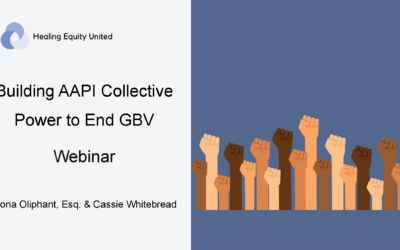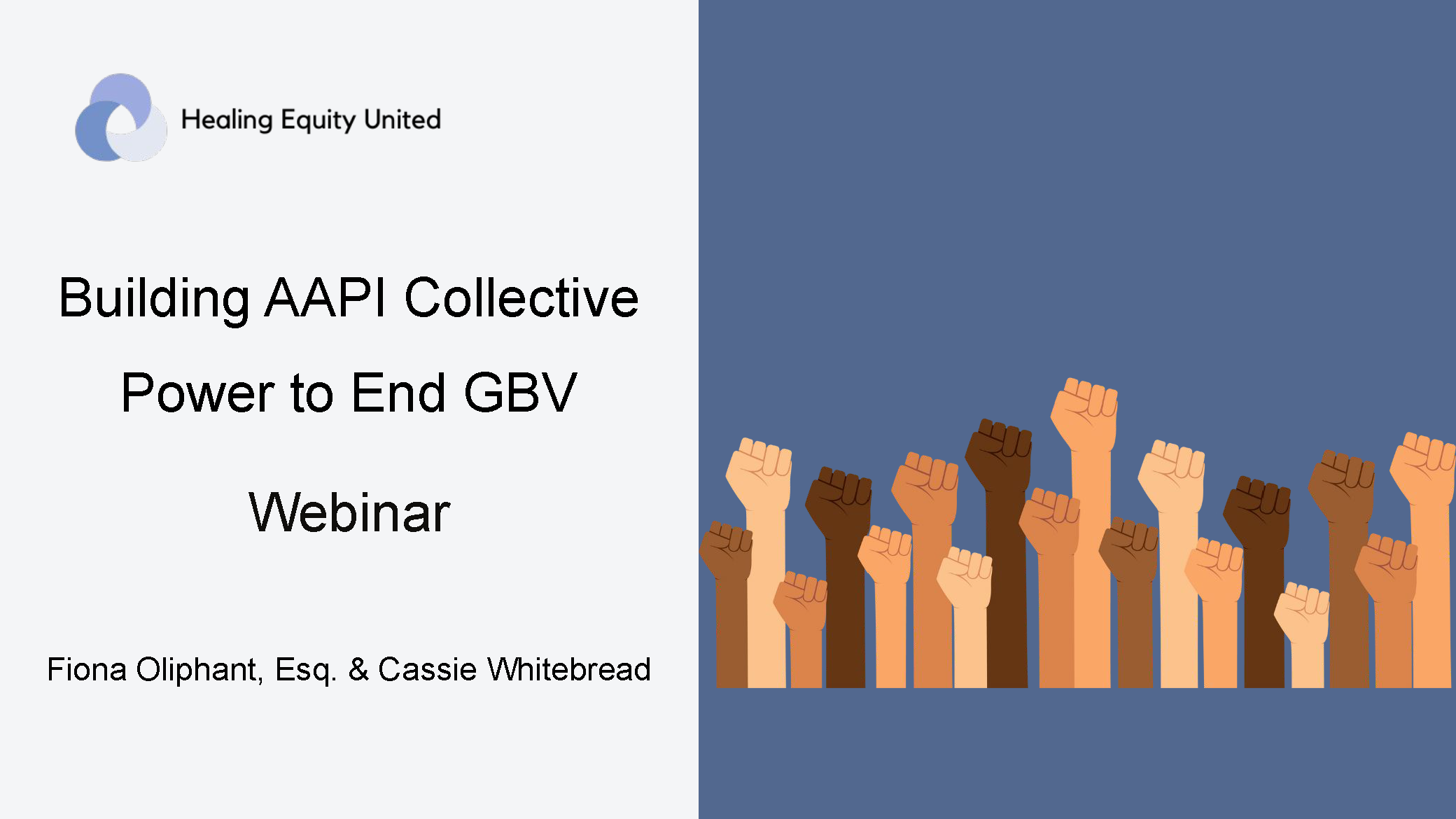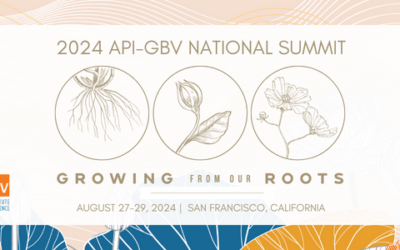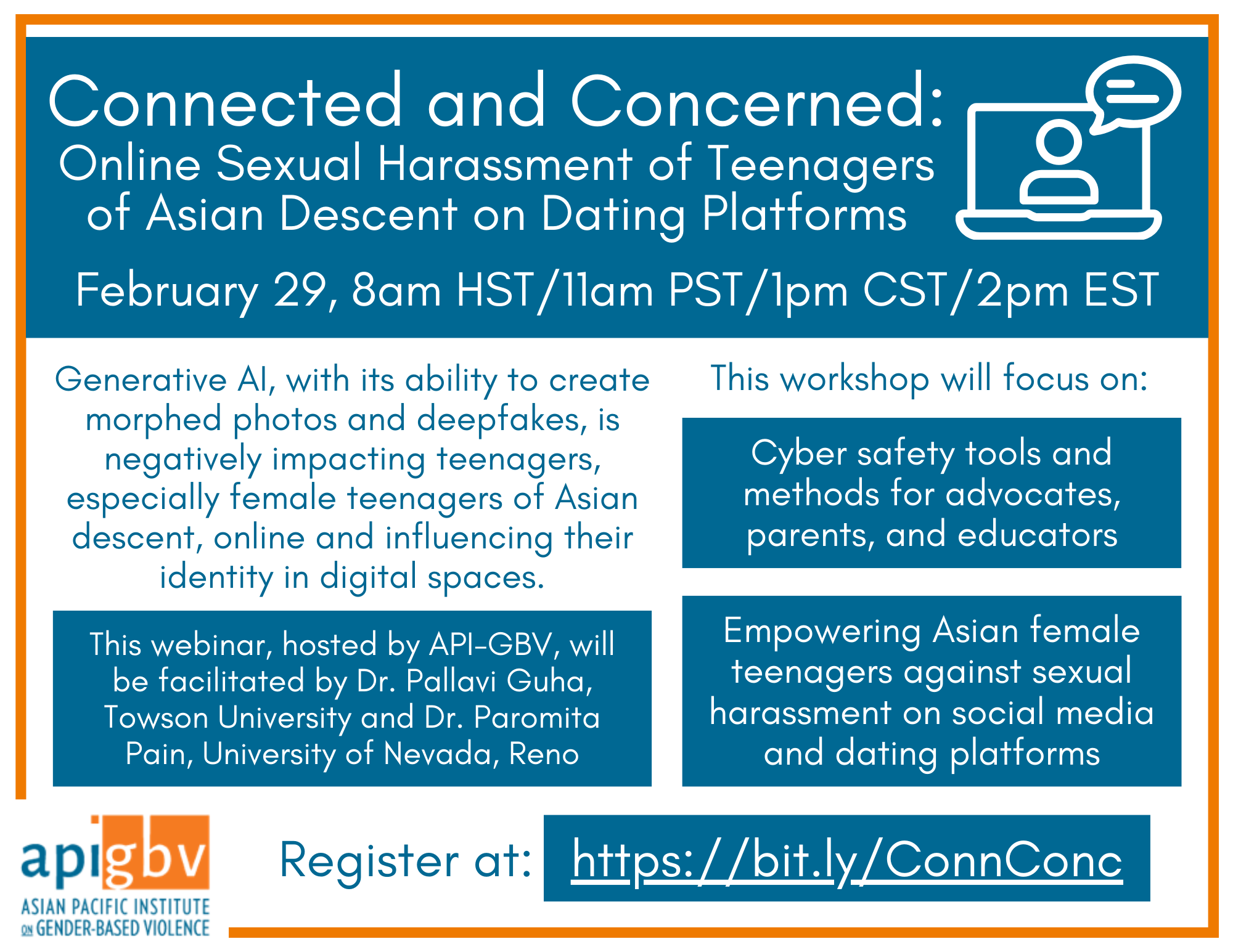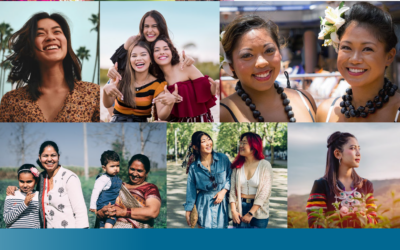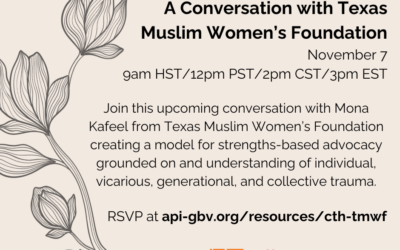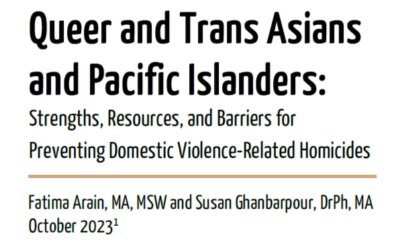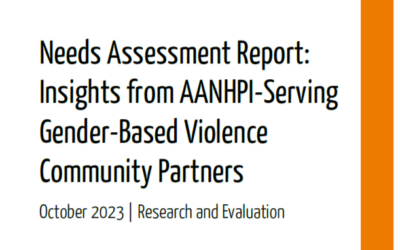News and Events
Critical Intersections of FGM/C: The Value of Intersectionality in Cross-Collaboration
April 23, 8am HST/11am PST/1pm CST/2pm EST
On April 23rd, API-GBV will be partnering with Sahiyo U.S. for Critical Intersections of FGM/C: The Value of Intersectionailty in Cross-Collaboration, a presentation of Sahiyo’s Mixed Methods Report as part of the survivor and activist-led Critical Intersections Research Project. This project examines the issue of female genital mutilation/cutting (FGM/C) through an intersectional lens, with the goal of understanding both challenges that FGM/C survivors and activists face, as well as opportunities for cross-sector collaboration with other social justice movements. The report includes qualitative and quantitative data from over 100 individuals and organizations working within and beyond the FGM/C sphere. In hopes of facilitating meaningful discussion around collaboration and intersectional programming, this presentation will focus heavily on challenges and opportunities to collaborative projects, with plenty of time for feedback and weigh in from the audience; turning data into action is our goal. Furthermore, as Sahiyo continues its exploration on this topic, we hope to expand our understanding with the insights of activists, frontline professionals, and more from across the board. Join the conversation!
Please email Sahiyo’s Research Coordinator rachel@sahiyo.org with any questions.
Related Resources
API-GBV Applauds the Revisions to Collecting Federal Data on Race and Ethnicity Statistical Policy Directive No. 15: Standards for Maintaining, Collecting, and Presenting Federal Data on Race and Ethnicity
April 1, 2024
Oakland, CA— The Asian Pacific Institute on Gender-Based Violence (API-GBV) applauds the Biden Administration’s announcement of revisions to Statistical Policy Directive No. 15 (SPD 15): Standards for Maintaining, Collecting, and Presenting Federal Data on Race and Ethnicity.
This long awaited development will bring additional visibility, understanding, and resources to subgroups within Asian American, Native Hawaiian, and Pacific Islander/Middle Eastern and North African (AANHPI/MENA) communities. Among the many changes, combining race and ethnicity into one question with the option to select all identities that apply and adding Middle Eastern or North African as a new minimum category are two significant changes in the new directives.
“These updates to data collection are crucial changes that have been highly requested by community based organizations (CBOs) that work with AANHPI and MENA survivors for a very long time,” said Monica Khant, API-GBV’s CEO. “AANHPI/MENA identities are not a monolith. AANHPI and MENA survivors come from over 50 countries and speak over 200 languages. Collecting further disaggregated data helps to identify disparities among different groups within our communities and allows CBOs to provide trauma-informed, culturally and linguistically specific support to best address the needs of survivors.”
The new standards took effect March 29, 2024 and requires federal agencies to have an implementation plan in place within 18 months. API-GBV looks forward to the swift and widespread implementation of these standards, and urges the U.S. Office of Management and Budget (OMB) to support collection of detailed data on AANHPI/MENA ethnic groups in as many instances as practicable.
To provide resources and culturally relevant services to survivors of gender-based violence (GBV), it is imperative to understand their unique experiences, which can be brought to light through disaggregated data. This is especially important in addressing GBV, as factors such as cultural norms, language barriers, immigration status, and socioeconomic factors can significantly impact an individual’s risk of experiencing violence and their access to resources and support services.
“API-GBV works to bridge the gap between CBOs and the survivors they support. For survivors of GBV the disparities are enormous,” said Sarah Khan, API-GBV’s Director of Programs. “With better data, we will be able to show policymakers, stakeholders, and advocates data that explains the different needs of our communities. Having data that is as diverse as we are allows CBOs to create stronger strategies and services to support survivors of gender-based violence.”
###
About Asian Pacific Institute on Gender-Based Violence
The Asian Pacific Institute on Gender-Based Violence (API-GBV) is a culturally specific national resource center on domestic violence, sexual violence, trafficking, and other forms of gender-based violence in Asian/Asian-American and Pacific Islander (AAPI) communities. API-GBV envisions a world free of gender-based violence for communities with equal opportunities for all to thrive. For more information about API-GBV, visit www.api-gbv.org.
Building AAPI Collective Power to End GBV
March 7, 8am HST/11am PST/1pm CST/2pm EST
Asians, Asian Americans, and Pacific Islanders (AAPIs) are often left out of conversations around diversity, equity, inclusion, and belonging (DEIB) in the U.S. Often lumped together as a “model minority,” certain AAPI groups benefit from privilege, while others are invisibalized and marginalized. In this webinar hosted by API-GBV and presented by Healing Equity United, we explored how AAPI individuals, community members, and anti-violence organizations can collectively advance diversity, equity, inclusion, and belonging in gender-based violence work. Presenters also discussed anti-Asian bias now and historically, anti-Blackness in the AAPI community, and findings from API-GBV’s 2023 DEIB cohort. Finally, they discussed how to intentionally shift organizations’ cultures to be anti-racist and anti-oppressive.
Interested in joining the 2024 Building AAPI Collective Power to End GBV: A Virtual Diversity, Equity, Inclusion, and Belonging Cohort? Read the cohort program descrption and submit your application by March 31.
Related Resources
Presented by Healing Equity United; hosted by API-GBV.
March 2024
2024 APi-GBV National Summit: Growing From Our Roots
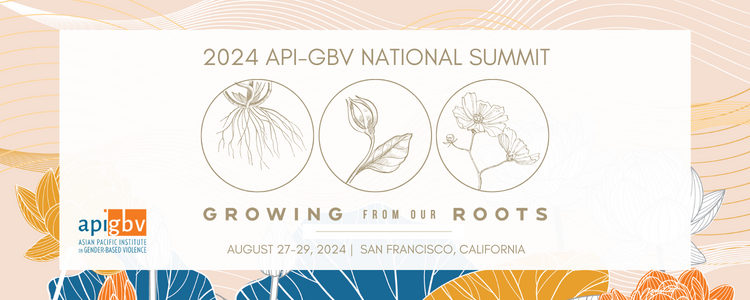
Latest Update: Early Bird Registration Open Now Through June 1!
See all available API-GBV National Summit information below:
This page will continue to be updated as more information is released. For any technical issues or additional questions, please contact our team at summit[at]api-gbv[dot]org.
Connected and concerned: Online sexual harassment of teenagers of Asian descent on dating platforms
February 29, 8am HST/11am PST/1pm CST/2pm EST
Generative AI, with its ability to create morphed photos and deepfakes, is negatively impacting teenagers, especially female teenagers of Asian descent, online and influencing their identity in digital spaces.
This workshop, with its focus on cyber safety tools and methods for advocates, parents, and educators, sought to empower Asian female teenagers against sexual harassment on social media and dating platforms. This webinar was facilitated by Dr. Pallavi Guha, Towson University and Dr. Paromita Pain, University of Nevada, Reno and hosted by API-GBV.
Related Resources
Facilitated by Dr. Pallavi Guha, Towson University and Dr. Paromita Pain, University of Nevada, Reno; hosted by API-GBV.
February 2024
Safeguard Asylum for Survivors – Tell Your Senator to Reject the Emergency National Security Supplemental Appropriations
February 5, 2024
On Sunday night, Senate negotiators released the text of the “Emergency National Security Supplemental Appropriations Act, 2024,” legislation intended to address defense funding and border security concerns. Unfortunately, this funding bill includes numerous immigration policy provisions that harm survivors fleeing gender-based violence and puts many others at increased risk of harm.
As individuals seeking protection arrive at the US Southern border and other ports of entry, we know that survivors from Asia, the Pacific, and the Middle East fleeing gender-based violence and harm are included among them. This bill’s unprecedented investment in detention and removal would not only deter these survivors from seeking asylum or reporting their experiences, but runs the risk of retraumatizing survivors by pushing them back into dangerous and unsafe conditions.
The bill also raises the credible fear screening standard for asylum, eliminates certain review processes, and requires rapid review of asylum cases without resources for meaningful examination. These provisions would virtually ensure that those who do try to seek asylum, especially survivors who’ve been traumatized, or those unfamiliar with US asylum law, would face nearly insurmountable odds at obtaining protection.
While the bill includes some positive elements that support survivors and protect against abuse, such as a pathway to legal status for Afghans who have fled their country, increases in family and employment visas, faster processing for employment authorization for certain individuals, and provisions protecting children of high-skill temporary workers from aging out of the opportunity to become lawful permanent residents, many of its provisions would increase the risk of trauma and endangerment for survivors.
API-GBV Director of Policy stated, “Asylum provides critical protection for survivors fleeing gender-based violence. Unfortunately, this legislation increases the barriers for survivors seeking that protection and will likely lead to increased trauma and victimization for those arriving in the United States. Although we welcome funding for resettlement, protections for Afghan arrivals, and increases in family and employment visas, this bill risks exacerbating the already difficult circumstances faced by vulnerable individuals seeking safety and refuge. As policymakers deliberate on immigration reform, we urge them to reject this bill and prioritize compassionate and comprehensive policies that recognize the needs of survivors of gender-based violence, including those from Asia, the Pacific, and the Middle East seeking safety.”
For additional information, please contact API-GBV’s Director of Policy, Grace Huang, at ghuang[at]api-gbv.org or (206)-420-7369.
TAKE ACTION + RESOURCES:
Email your Senator to demand they reject these efforts here.
To call your Member of Congress, find their contact information here.
Learn more about what is in the bill:
Elevate this issue on social media:
Attend ACLU’s Press Conference and Lobby Day at 11am ET tomorrow, Tuesday, February 6 at Methodist Building (100 Maryland Ave NE, Washington, DC)
Past Events
Safeguard Asylum for Survivors – Tell Your Senator to Reject the Emergency National Security Supplemental Appropriations
February 5, 2024
On Sunday night, Senate negotiators released the text of the “Emergency National Security Supplemental Appropriations Act, 2024,” legislation intended to address defense funding and border security concerns. Unfortunately, this funding bill includes numerous immigration policy provisions that harm survivors fleeing gender-based violence and puts many others at increased risk of harm.
As individuals seeking protection arrive at the US Southern border and other ports of entry, we know that survivors from Asia, the Pacific, and the Middle East fleeing gender-based violence and harm are included among them. This bill’s unprecedented investment in detention and removal would not only deter these survivors from seeking asylum or reporting their experiences, but runs the risk of retraumatizing survivors by pushing them back into dangerous and unsafe conditions.
The bill also raises the credible fear screening standard for asylum, eliminates certain review processes, and requires rapid review of asylum cases without resources for meaningful examination. These provisions would virtually ensure that those who do try to seek asylum, especially survivors who’ve been traumatized, or those unfamiliar with US asylum law, would face nearly insurmountable odds at obtaining protection.
While the bill includes some positive elements that support survivors and protect against abuse, such as a pathway to legal status for Afghans who have fled their country, increases in family and employment visas, faster processing for employment authorization for certain individuals, and provisions protecting children of high-skill temporary workers from aging out of the opportunity to become lawful permanent residents, many of its provisions would increase the risk of trauma and endangerment for survivors.
API-GBV Director of Policy stated, “Asylum provides critical protection for survivors fleeing gender-based violence. Unfortunately, this legislation increases the barriers for survivors seeking that protection and will likely lead to increased trauma and victimization for those arriving in the United States. Although we welcome funding for resettlement, protections for Afghan arrivals, and increases in family and employment visas, this bill risks exacerbating the already difficult circumstances faced by vulnerable individuals seeking safety and refuge. As policymakers deliberate on immigration reform, we urge them to reject this bill and prioritize compassionate and comprehensive policies that recognize the needs of survivors of gender-based violence, including those from Asia, the Pacific, and the Middle East seeking safety.”
For additional information, please contact API-GBV’s Director of Policy, Grace Huang, at ghuang[at]api-gbv.org or (206)-420-7369.
TAKE ACTION + RESOURCES:
Email your Senator to demand they reject these efforts here.
To call your Member of Congress, find their contact information here.
Learn more about what is in the bill:
Elevate this issue on social media:
Attend ACLU’s Press Conference and Lobby Day at 11am ET tomorrow, Tuesday, February 6 at Methodist Building (100 Maryland Ave NE, Washington, DC)
API-GBV’S CALL FOR A CEASEFIRE AND AN END TO THE LOSS OF INNOCENT LIVES
November 22, 2023
Oakland, CA — The Asian Pacific Institute on Gender Based Violence (API-GBV) is horrified by the violence in the Israel-Hamas war. We are struggling to process our grief while continuing to educate ourselves and remain engaged. While we have heard about the hostage deal and temporary pause in violence, we know that this is not a long-term solution. As antisemitism, Islamophobia, xenophobic hate, and division in the U.S. rise and continue to impact our communities, we extend our support and pleas to work in solidarity to permanently end the violence.
Our hearts are with all those who are suffering as civilian lives continue to be victimized, displaced, and lost. As seen through past wars, conflicts, and oppressions, gender-based violence is used as a weapon to further devastate communities, disproportionately impacting women, children, elders, and those with disabilities. Conflict has never been gender neutral, and neither will its enduring consequences.
API-GBV remains in solidarity with all survivors of gender-based violence and prioritizes safety for the people in Palestine and Israel. We are calling for an immediate ceasefire and an end to the loss of innocent lives in this humanitarian crisis.
We understand how difficult it is to be scared for loved ones and offer our strong support to advocates and direct services organizations, who are shouldering the burden of the impact of this conflict, while remaining resilient in the face of hate. Furthermore, we grieve with those in our communities who have lost loved ones in the conflict or who remain in danger.
Below is a list of resources to provide additional support for those in need:
- Crisis Text Line: crisistextline.org
- Get Help Israel’s Crisis Support Center: gethelpisrael.com/webpage/?title=israel-crisis-support-center
- The Institute for Social Policy and Understanding’s Muslim Mental Health Toolkit: ispu.org/mental-health
- Khalil Center Mental Health Services: khalilcenter.com/mental-health-services
- Naseeha: naseeha.org
- The Safe Place: iOS app, apple.com/us/app/the-safe-place/id1349460763
- Sikh American Legal Defense and Education Fund Mental Health Resources: saldef.org/mentalhealth/
- The Sikh Coalition: sikhcoalition.org/
- Sikh Family Center Mental Health Resources: sikhfamilycenter.org/mental-health/
- Stones to Bridges: stonestobridges.org
- Stop AAPI Hate Community Resources: stopaapihate.org/community-resources/
###
About Asian Pacific Institute on Gender-Based Violence:
The Asian Pacific Institute on Gender-Based Violence (API-GBV) is a culturally specific national resource center on domestic violence, sexual violence, trafficking, and other forms of gender-based violence in Asian/Asian-American and Pacific Islander (AAPI) communities. API-GBV envisions a world free of gender-based violence for communities with equal opportunities for all to thrive. For more information about API-GBV, visit www.api-gbv.org.
Impact Report FY22: Growing Stronger Together to Build Collective Power
The Asian Pacific Institute on Gender-Based Violence (API-GBV) is a culturally specific national resource center on domestic violence, sexual violence, trafficking, and other forms of gender-based violence in Asian/Asian-American and Pacific Islander (AAPI) communities. Our mission is to disrupt gender-based violence, which causes physical, sexual, emotional, spiritual and economic harm within AAPI communities throughout the U.S. and its territories. We envision a world free of gender-based violence for communities with equal opportunities for all to thrive.
API-GBV has been a culturally specific resource center in this field for the AAPI community since 2000 and we are proud to unveil our second Impact Report! This Impact Report highlights the incredible work, in FY22, of our team and community as we uplift AAPI survivors and community based organizations. Our work is powerful and our communities continue to grow stronger together as we build collective power to end gender-based violence.
Related Resources
Impact Report FY22: Growing Stronger Together to Build Collective Power
Asian Pacific Institute on Gender-Based Violence
Culture, Trauma, and Healing: A Conversation with Texas Muslim Women’s Foundation
November 7, 9am HST/12pm PST/2pm CST/3pm EST
In our work, we recognize that cultural-responsiveness and trauma-informedness are not end goals, but a continuous process of learning and adapting our advocacy to best meet the layered and changing needs of survivors. We also know that these practices don’t end at advocate-client interactions, but must encompass all aspects of an organization, from to staff and Board wellness to physical space.
This conversation with Mona Kafeel from Texas Muslim Women’s Foundation looked at creating a model for strengths-based advocacy grounded on and understanding of individual, vicarious, generational, and collective trauma. Mona discussed how the Trauma-Informed Care Assessment Tool, the Survivor Well-Being Questionnaire, and other practical tools developed by TMWF can be used to assess your organization for gaps in trauma-informedness and to identify better organizational policies.
We strongly suggested that participants review the report, From the Roots of Trauma to the Flowering of Trauma-Informed Care, and especially the evaluation tools and implementation plan contained within the appendix, prior to joining the webinar.
Related Resources
Hosted by API-GBV featuring Mona Kafeel from Texas Muslim Women’s Foundation
November 2023
Queer and Trans Asians and Pacific Islanders:
Strengths, Resources, and Barriers for Preventing Domestic Violence-Related Homicides
This report presents a groundbreaking qualitative research project focusing on the prevention of domestic violence-related homicides among queer and trans Asians and Pacific Islanders (QTAPI). It uncovers the complex web of risk factors, including isolation and systemic oppression, which heighten the vulnerability of QTAPI survivors. Despite these challenges, the report highlights community-driven solutions that emphasize cultural values and healing, ultimately offering hope for a more supportive and inclusive future.
Related Resources
Fatima Arain, MA, MSW and Susan Ghanbarpour, DrPh, MA
The original version of this report was created by the authors in October 2020, and it was subsequently updated in October 2023 by Dr. Swathi Reddy and Krista Grajo, both affiliated with API-GBV.
2023 CBO Needs Assessment Report & Summary
This report explores and contextualizes the results from API-GBV’s 2023 needs assessment on AANHPI-serving GBV community organizations. The findings support a sustained need for culturally responsive programming and research; specialized training opportunities for volunteers and staff; technical assistance to strengthen organizational capacity; and policy advocacy to address the systemic, root causes of gender-based violence while promoting healthier families and relationships.
—
This summary provides key findings from API-GBV’s 2023 Needs Assessment as a snapshot of the full report, which will provide more in-depth analysis and discussion on the needs of AANHPI-serving GBV community organizations. Major findings from this summary include a look at which communities require additional support, concerns that intersect with GBV for AANHPI survivors, current challenges for staff and providers, and areas of cultural strengths and needs among AANHPI-serving GBV organizations.
Related Resources
API-GBV Research and Evaluation
Krista Grajo, MA; Shirley Luo; and Swathi Reddy, PhD, LMSW
Full Report, October 2023
Summary Report, September 2023


